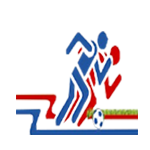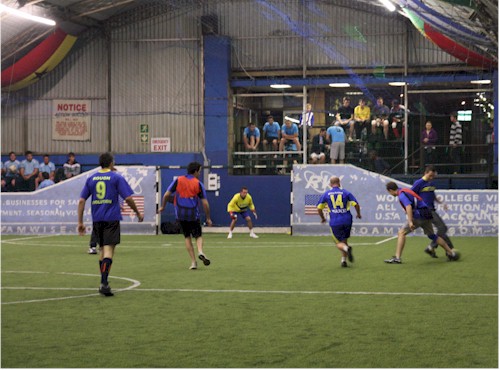1. THE BALL
- All Action Soccer games will be played with a size 4 ball
2. THE PLAYERS
- Action Soccer is played by 6 players (1 Goalkeeper and 5 Outfield players).
- The minimum number of players to start is 4.
- The minimum number of players to finish is 4.
- Failure to have enough players on the field due to late coming or expulsion will result in the game being abandoned and / or forfeited.
3. SUBSTITUTIONS
- The maximum number of substitutes is 6 players.
- There is no limit on the amount of substitutions during a game.
- Substitutions will be done with 1 player leaving the playing area and his replacement taking the field only once the substituted player has left the field. Failure to comply with this law will result in a penalty being awarded against the offending team.
- Goalkeeper substitutions will only be done when the ball is dead. Example when a free kick is awarded or a goal has been scored. The referee needs to be informed and will have to give his consent.
- Substitutions must be made on your end of the field and not your opponents. Failure to do so will result in a penalty.
4. EQUIPMENT
- All teams have to be kitted out in the same colour tops. Failure to do so will result in offending player being refused to play.
- No Outdoor Soccer or studded boots will be permitted to be used. No exception!
- All footwear will have to have rubber soles. If unsure, please confirm with arena management.
- Bibs are solely to be used if both teams’ colours clash.
- Wearing shin pads is advised, but not compulsory. Remember, this is soccer and has contact.
5. THE REFEREE
- The referee is here to enforce the laws of the game, keep records of the games, stop games when deemed necessary, caution or expel players for misconduct, violent conduct or unsportsmanlike behaviour. He will also stop games to attend to serious injuries and to signal the restart after every stoppage.
- The referee is permitted to abandon games in the event of both teams fighting or in the event of a full team verbally abusing and threatening him.
- The referee will also start the clock and keep time of 2 minutes and 5 minutes respectively when players are sent off.
- The referee will also keep track and take score.
- Football has laws and not rules. Laws are interpreted by the referees.
- The referee’s decision is final. Please respect that.
6. DURATION OF GAME
- The game will be played over 2 equal periods of 20 minutes each. Time can only be prolonged at the end of each half in the event of a penalty.
- There will be a 1 minute interval between each period.
7. START OF PLAY
- The ball must be played backwards from kick off.
- The ball has to be stationary in order to take kick off or any free kick.
- The ball is in play after it has travelled the distance of its own circumference.
- No team is permitted to play unless they have a minimum of 4 players on the field.
8. FOULS
- All Free Kicks outside the area are Direct.
- All Free Kicks inside the area are Indirect.
- A Free Kick or Penalty will be awarded when a player intentionally commits any of the following:
- Kicking or attempting to kick an opponent.
- Tripping an opponent.
- Jumping into an opponent.
- Charging an opponent in a violent or dangerous manner.
- Charging an opponent from behind.
- Striking, attempting to strike or spitting at an opponent. Such infringement will result in an expulsion.
- Holding an opponent.
- Pushing an opponent.
- Charging an opponent with their shoulders. Ie. Shoulder charge.
- Sliding at an opponent. Ie. Sliding tackle.
- Playing the ball when on the floor.
- Handling the ball with his hands.
- Taking longer than 5 seconds to play a free kick.
- The Goalkeeper throws the ball directly over the halfway line. The Free Kick will take place at the halfway line.
- The Goalkeeper slides and plays the ball/or player outside his box.
- An Indirect Free Kick will be awarded when:
- The Goalkeeper handles, releases the ball and the picks it up. A goalkeeper can release the ball, take it out of the box, then back in to pick it up. That is allowed.
- The Goalkeeper kicks the ball directly out of his hands. The goalkeeper must drop kick the ball.
- The Goalkeeper picks up or touches with his hand a back pass. (A back pass is defined as an intentional pass to the keeper either directly or off the wall. The keyword is INTENT. A back pass is also any pass below the knee).
- The Goalkeeper controls the ball with his hands and does not release the ball within 5 seconds.
- Dangerous play occurs in the area with no contact made. Ie. High Foot.
- 2 on 1. There is no such rule in Action Soccer although “sandwiching” a player is not allowed and will result in a free kick.
- Tackling from behind. A player may attempt to get the ball from behind if no contact gets made. If any contact is made, then a free kick will be awarded.
9. EXPULSION (YELLOW AND RED CARDS)
- A yellow card equates to an expulsion of 2 minutes. After a period of 2 minutes, the referee will signal for same or other player to enter the field
- Yellow and Red Cards will be awarded at the referees discretion. His decision is final and will be respected.
- A yellow card is awarded for:
- Foul Play
- Foul or abusive language towards other player or referee.
- Unsportsmanlike behaviour.
- Second instance of a caution-able offence.
- Violent Conduct.
- Intentionally impeding a clear goal opportunity.
- A Red Card equates to an expulsion of 5 minutes. After a period of 5 minutes, the referee will signal for another player to enter the field. Red-carded player will not be able to play again for that match.
- A Red Card is awarded for:
- Serious Foul Play.
- Serious Violent Conduct.
- Second Yellow Card.
- Serious Foul or abusive language towards other player or referee.
10. POWER PLAY
- A Penalty will be awarded if a team has more than the consented number of players on the field. This also applies to substitutions being made whereby a player has entered the field before a player has exited.
11. FREE KICKS: DIRECT AND INDIRECT
- Opposing players must be a distance of 2 metres from the ball. If the referee needs to request this distance and it is not obeyed, then a yellow card can be issued.
- Last line of defence will be the goal line.
- The kicker cannot touch the ball again until it has been touched by another player.
- The ball is in play after it has travelled the distance of its own circumference.
12. PENALTY KICKS
- Penalty kicks are to be taken from the penalty spot.
- The kicker has to have his non-kicking foot directly alongside the ball.
- The goalkeeper has to stay on his goal line until the whistle has been blown.
- All other players must be out the area.
- The Goalkeeper is allowed to rush off his line and/or play the ball once the referee has played his whistle.
- The goalkeeper cannot slide out of his area. Failure to do so will result in the Penalty being retaken.

